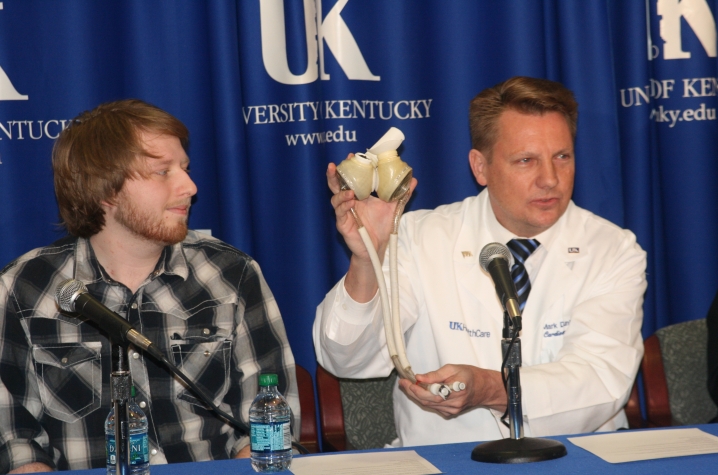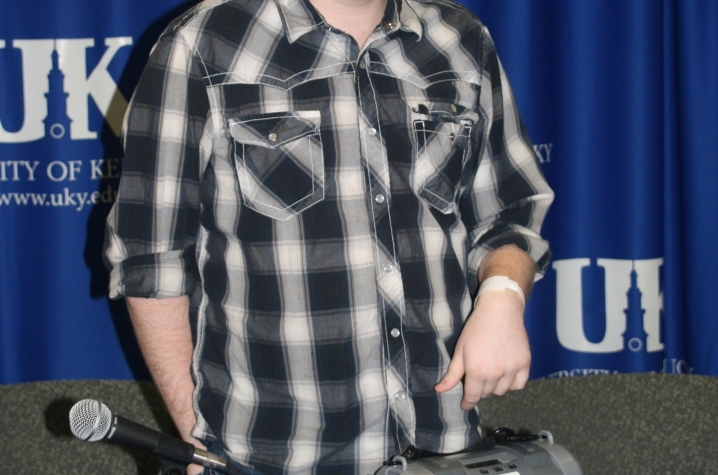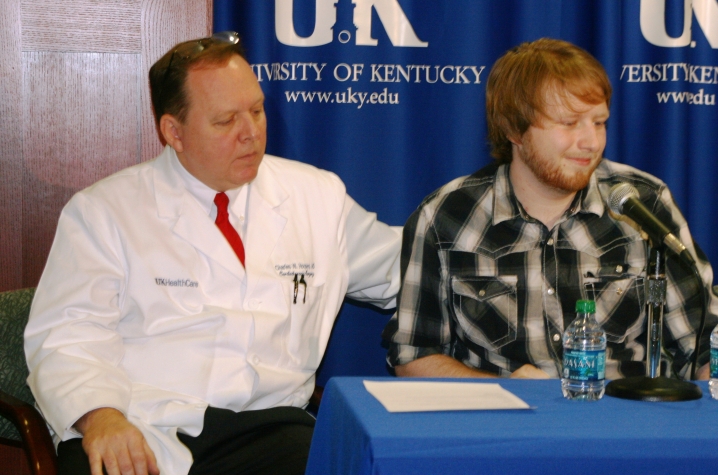UK First in Kentucky to Implant SynCardia Total Artificial Heart
LEXINGTON, Ky. (March 5, 2012) — The University of Kentucky today announced the state's first implantation of the SynCardia Total Artificial Heart as a bridge to transplant. UK is one of 29 medical centers in the country certified to perform this procedure.
On Friday, Feb. 10, 20-year-old Zack Poe of Maysville, Ky., became the state's first patient to receive the Total Artificial Heart. Poe, diagnosed with heart failure on Jan. 3 at St. Elizabeth Hospital in Edgewood, Ky., was referred to UK for consideration of advanced treatment options by Dr. D.P. Suresh.
The Total Artificial Heart (TAH) is a device that contains the same components as a real human heart. For patients who are dying of end-stage biventricular failure, the only options are an immediate donor human heart or a TAH as a bridge to transplant. The TAH helps keep patients healthy while waiting on a viable donor heart to become available — which could take weeks, months, or even years.
UK surgeons Dr. Charles Hoopes, director of the UK Heart and Lung Transplant Program and the Mechanical Cardiac Support Program, and Dr. Mark Plunkett, chief of Cardiothoracic Surgery and the co-director of the Linda and Jack Gill Heart Institute, have both received certification from SynCardia to perform this procedure. To become eligible to perform the procedure, medical centers are required to undergo a stringent four-part certification process.
"UK HealthCare’s ability to save and improve the lives of the most critically ill patients from Kentucky and beyond by performing procedures such as transplants, VADs (ventricular assisted devices) and now the Total Artificial Heart with the Freedom Driver, makes us truly one of the most comprehensive, multidisciplinary medical facilities in the country,” said Dr. Michael Karpf, UK executive vice president of health affairs.
At the time of his diagnosis, Poe's ejection fraction — a measurement that shows the amount of blood the heart can pump out into the body during each beat — was less than 10 percent, according to Dr. Navin Rajagopalan, the Medical Director of Heart Transplantation and Heart Failure Services at UK. Ejection fraction in a healthy individual is generally 55-75 percent.
"Apart from his heart failure, Zack is a strong, healthy young man," Hoopes said. "But because of the severity of the heart failure, we felt he was the perfect candidate to receive the Total Artificial Heart while he waits on an appropriate donor heart."
Hoopes and Plunkett led the surgical team during the procedure. Within days of the surgery, Poe was able to get up and move around his room.
"The surgery took about four hours and was extremely successful. We are delighted with the way Zack has responded to the Total Artificial Heart," Plunkett said. "His blood flow has dramatically improved, and he was up walking around within several days of the surgery. He's made a remarkable recovery and he's feeling better than he has in months."
Poe's mobility improved greatly last week when he received the SynCardia Freedom Driver, a wearable, portable device that powers the Total Artificial Heart. The Freedom Driver weighs just 13.5 pounds and is carried in a small backpack or shoulder bag.
With the Freedom Driver — currently available only as part of a clinical trial in the U.S. — patients can return home and resume many of their daily functions while waiting on a new heart.
"The mobility that the Freedom Driver allows is a great benefit to patients who receive the SynCardia Total Artificial Heart," said Dr. Jay Zwischenberger, chair of the UK Department of Surgery. "Zack will be able to go home and enjoy his life, rather than waiting months in a hospital room for a donor heart."
A second UK patient underwent successful Total Artificial Heart implantation last Wednesday. The patient is currently recovering in the hospital and doing well.
Media Contact: Allison Perry, (859) 323-2399 and allison.perry@uky.edu







